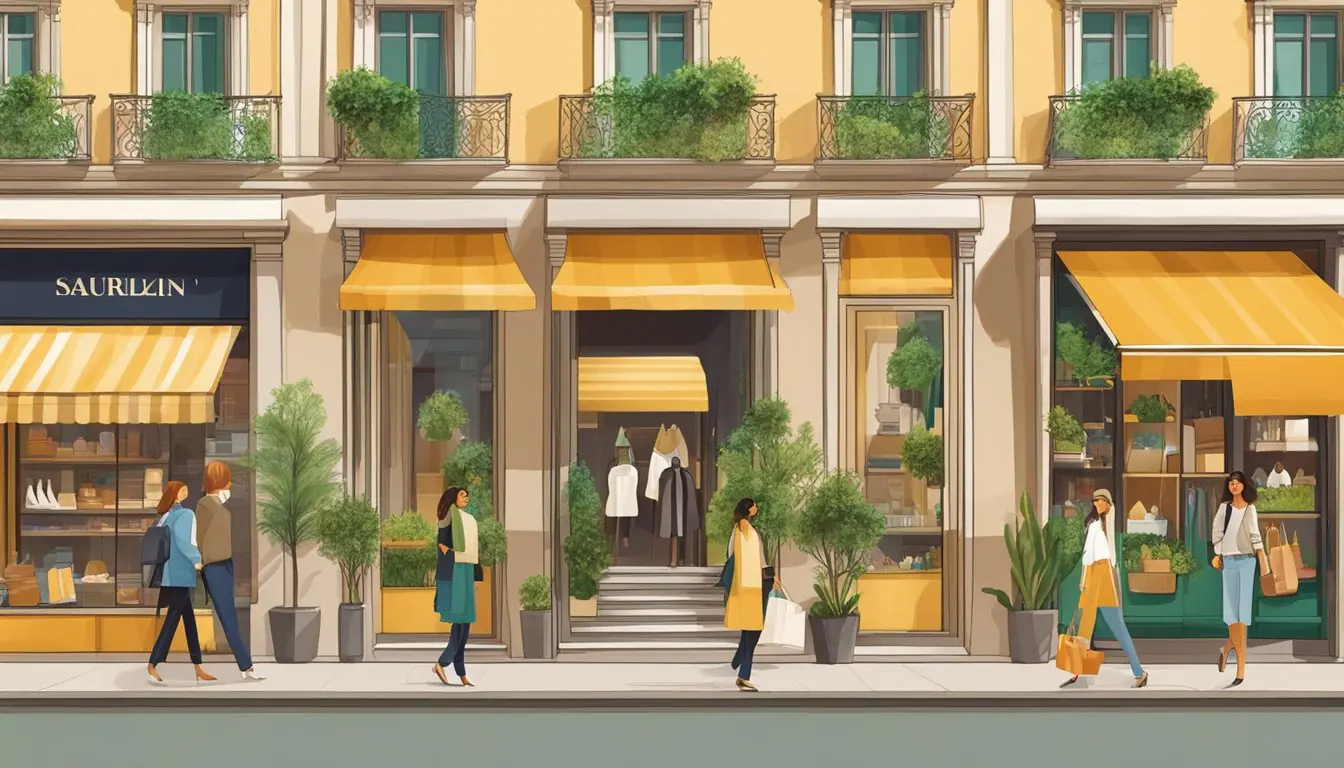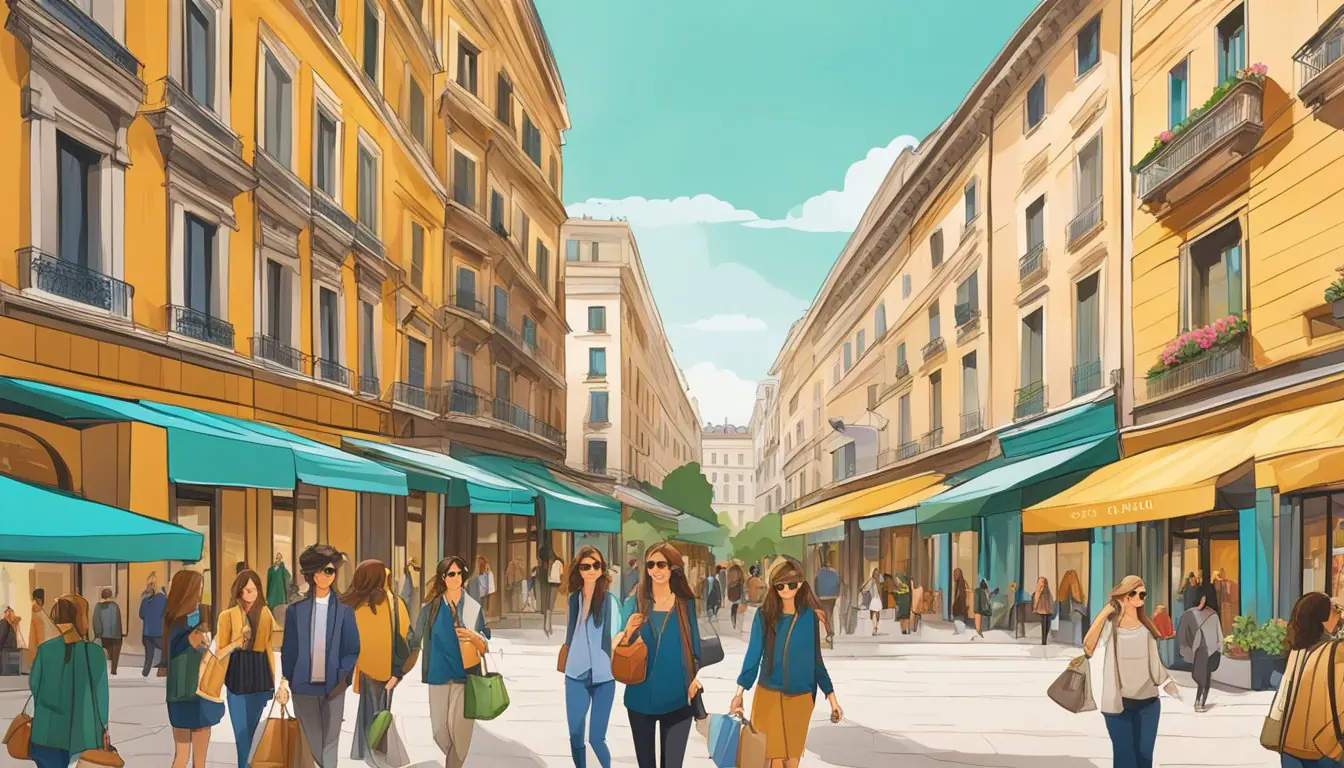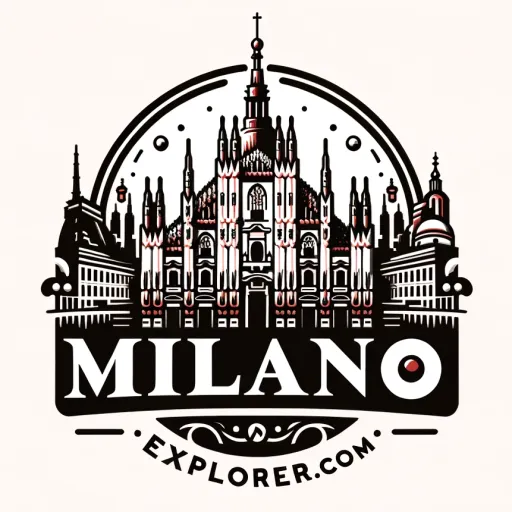Milan, often hailed as the epicenter of high fashion, has seen a surge of eco-consciousness among its luxury brands. As we traverse the landscape of high-end fashion, the city stands as a beacon for sustainability, shaping the industry’s future with innovative designs underpinned by eco-friendly practices. The top sustainable fashion brands in Milan are not just making a statement with their aesthetics but are deeply committed to environmental and social responsibility, paving the way for a greener wardrobe.

Amidst the historic streets and modernist architecture of Milan, these fashion houses are redefining luxury. From the use of recycled materials to ensuring fair labor practices, Milanese brands have incorporated sustainability into every thread of their garments without compromising on style. This approach resonates with the growing demand from consumers who seek both elegance and ethical assurances from their fashion choices.
Best Sustainable Fashion Brands
Key Takeaways
- Milan is a leading city in intertwining sustainability with luxury fashion.
- Top Milanese brands prioritize eco-friendly materials and ethical production.
- Consumer demand for ethically produced fashion is shaping Milan’s industry trends.
The Emergence of Sustainable Fashion
In Milan, the heart of fashion innovation, we are witnessing a significant shift toward sustainability as local brands forge new eco-friendly paths in response to the perils of fast fashion.
Defining Sustainable Fashion
Sustainable fashion refers to clothing and accessories designed, manufactured, and distributed in ways that optimize benefits to society and the environment, while minimizing the carbon footprint. It encompasses the use of materials that are either biodegradable or recyclable, ethical labor practices, and a production system mindful of its water and energy consumption. Milan’s commitment to integrating sustainable practices is evident in initiatives by brands that prioritize not just aesthetics but also the well-being of our planet.
The Impact of Fast Fashion
The rise of fast fashion has become a duel with disastrous environmental impacts, leading to massive carbon emissions and waste. This retail model thrives on rapid production cycles, low costs, and a culture of disposability, contributing significantly to climate change. However, Milan’s sustainable fashion brands are taking a stance, employing strategies to counteract these trends by embracing slow fashion principles and promoting sustainability. They are reducing the industry’s environmental impacts while setting an example for the global fashion scene.
Key Components of Sustainability in Clothing

In crafting sustainable fashion, we give priority to responsible material sourcing and ethical production practices. These components are crucial for minimizing environmental impact and promoting social equity in the clothing industry.
Material Sourcing and Recycling
We prioritize sustainable materials like organic cotton and Tencel for their lower environmental footprint. Additionally, we focus on recycled materials to reduce waste. The process of upcycling allows us to transform deadstock fabrics into new garments. We also ensure the materials we use are biodegradable, ensuring they can break down naturally without harming the ecosystem. Our commitment to sourcing organic fabrics means we avoid pesticides and chemicals, ensuring the safety and health of both our consumers and the planet.
Ethical Production and Labor Practices
Our brand is built on a foundation of ethical production. This means that we must provide fair working conditions and ensure a living wage for every individual involved in making our clothes. We thoroughly vet our partners to confirm they share our commitment to these ideals, guaranteeing that our products are not only environmentally sustainable, but socially responsible as well. A transparent supply chain allows us to confirm these practices are upheld, allowing us to stand behind our garments with confidence.
Certifications and Standards for Sustainable Fashion

When selecting sustainable fashion brands in Milan, it’s important to consider the certifications and standards they adhere to. These serve as the bedrock of trust and integrity within the industry.
Understanding Different Certifications
In the realm of sustainable fashion, various certifications provide assurance that a brand meets specific ethical and environmental criteria. For instance, Global Organic Textile Standard (GOTS certified) is one of the leading textile certifications, ensuring that clothes are made with a significant percentage of organic fibers and that responsible manufacturing processes are followed. The OEKO-TEX Standard 100 is another pivotal certification that tests for harmful substances, supporting consumer safety in textiles. Fairtrade Certified marks brands that align with higher social, environmental, and economic standards, particularly benefitting the farmers and workers involved in the supply chain.
The Role of Standards in Transparency
Standards in sustainable fashion are not only about environmental welfare but also about fostering transparency. Brands that are recognized as Certified B Corporations have met rigorous standards of social and environmental performance, confirming their dedication to transparency and accountability. When we talk about transparency, it implies that the practices, from sourcing to manufacturing and distribution, are clear and traceable. This kind of openness is paramount for us as consumers to make informed decisions about the clothes we wear.
Evaluating Sustainable Fashion Brands

In navigating Milan’s fashion scene, it’s crucial to distinguish brands that are genuinely committed to sustainability. We look at the specific criteria that set these brands apart and spotlight select labels leading the way in conscientious fashion manufacturing.
Criteria for Sustainability Ratings
When rating sustainable fashion brands, we consider several key factors. The materials used, such as organic cotton or recycled polyester, significantly impact a brand’s eco-footprint. Next, we assess the production processes, from water usage to chemical management, to ensure minimal environmental strain. Ethical labor policies are another critical aspect, as sustainability also encompasses fair working conditions and wages. Additionally, transparency and circularity, where brands facilitate product life-extension through recycling or repurposing, are vital for higher ratings. Leading organizations like Good On You offer comprehensive sustainability ratings that reflect these criteria.
Spotlight on Noteworthy Brands
Numerous Milan-based brands have embraced sustainability. Ecoalf creates high-quality garments from recycled waste, asserting that there’s no need for raw materials in the fashion industry. Another commendable label is Mud Jeans, which not only offers denim from organic and recycled materials but also encourages a circular economy with their unique lease system. For those seeking ethically produced fashion, People Tree has been a pioneer in sustainable and Fair Trade practices.
Amour Vert stands out for their strict use of sustainable materials and ethical manufacturing, planting a tree for every t-shirt sold. Meanwhile, Tentree is known for their commitment to plant ten trees for each item purchased. Patagonia not only leads with sustainable outdoor clothing but actively engages in environmental activism. ArmedAngels focuses on timeless designs and transparency, championing organic materials and fair wages.
If denim is your priority, look no further than Kings of Indigo, who prioritize organic and recycled materials. For those interested in innovation within the sustainable fashion spectrum, Kuyichi has been at the forefront, dedicated to organic cotton and ethical production since its inception.
Consumer Behavior and Sustainable Fashion

In an era where fashion intersects with environmental consciousness, our purchasing decisions herald significant implications for sustainability. We, as consumers, wield the power to influence the industry through the choices we make.
The Role of the Consumer in Sustainability
We play a pivotal role in driving the fashion industry towards sustainability. When we prioritize clothing from brands that commit to eco-friendly practices, we help promote the demand for sustainable fashion. Brands that use biodegradable packaging, maintain carbon neutral operations, or partake in initiatives like Pact reflect an environmental ethos that resonates with our values.
How Purchasing Choices Make an Impact
Each article of clothing we buy has a lifecycle and a carbon footprint attached to it. By opting for brands that use sustainable packaging, we contribute less waste to landfills and encourage a circular economy. Companies integrating packaging made from recycled materials set industry standards that align with our vision of a sustainable future. Our commitment to fashion longevity, rather than disposability, also ensures that we minimize our own carbon footprint, fostering a more eco-friendly world.
Innovation and Future of Eco-Fashion

As we explore the evolution of sustainability in the fashion world, it’s clear that innovation and adherence to environmental standards are the driving forces behind the new era of eco-fashion in Milan.
Emerging Technologies in Sustainable Clothing
We’re witnessing the rise of innovative materials and processes that redefine what clothing can be. Renewable energy is powering production methods that aim for zero waste, with some brands developing biodegradable fabrics and dyes that leave minimal environmental impact. For instance, the integration of sustainable denim projects by high-end labels like Gucci marks a shift towards more conscious manufacturing practices.
The Circular Economy and Future Trends
The circular economy is the foundational element that will likely guide future trends in Milan’s fashion scene. A product lifecycle that supports reuse, recycling, and responsible disposal is not just a trend but a long-term commitment. Embracing the circular approach, fashion brands ensure that every piece produced aligns with strict environmental standards, striving to achieve a balance between high fashion and high ethics. Milanese brands that are pioneering this transformation offer us a glimpse into a world where fashion not only looks good but is undeniably good for our planet.
Challenges and Controversies

In the fashion capital of Milan, sustainable brands face diverse challenges and controversies as they strive to marry fashion with ethical practices.
Addressing the Issue of Greenwashing
Greenwashing is a significant challenge as brands may be accused of giving a misleading impression of their environmental efforts. It is crucial for us to discern between genuine sustainability and marketing ploys. For instance, a brand might promote “eco-friendly” products that are still steeped in chemicals and pesticides, undermining their claims. As concerned shoppers, our demand for transparency is at an all-time high, ensuring that the sustainability touted by a brand extends beyond mere words. Five Emerging Sustainable Brands From Milan’s WSM Trade Show provides insight into brands that are navigating these complexities.
Complexities of Sustainable Fashion
The path to truly sustainable fashion involves navigating a maze of complexities, including ethical practices and fair labor practices. Ensuring that animal rights are respected or that plastic bags are eliminated from packaging requires a multifaceted approach. Moreover, pursuing sustainability often involves innovating materials and processes to reduce environmental impact. For us, a deeper understanding of the supply chain is necessary to appreciate the challenges faced by these brands. Learners like us can observe how brands at White Sustainable Milano strive to keep an eye on such multifaceted aspects of sustainability.
Global Influence and Cultural Shifts

In the evolving sphere of Milan’s fashion scene, we witness a striking interplay between sustainability and the city’s global footprint. Milan not only shapes but also adapts to the dynamic intercultural influences reshaping the fashion industry today.
Fashion Weeks and International Influence
Milan Fashion Week has become a pivotal stage where sustainability intersects with global trends. Here, fashion brands from Milan have not only showcased their collections but have also fostered international collaborations that often address broader issues like the pandemic’s impact and gender inclusivity. For example, the emerging fashion brands have been pivotal at the fashion weeks, demonstrating that Milan’s style is not stagnant but continually evolving through diverse influences.
Cultural Dynamics and Adaptation
The cultural dynamics of Milan’s fashion industry hint at an adaptive ecosystem. With an increasing number of fashion brands in Italy looking to become B Corporations, there’s a clear pivot towards ethical practices that transcend mere location. Milan’s role in this shift is integral, as evidenced by initiatives such as those seen during Milano’s Sustainable Fashion Week, echoing a universal call for a greener future. Through these platforms, there’s a conscious effort to blend Italian craftsmanship with sustainable practices, marking a significant cultural adaptation within the industry.
Conclusion

In our journey to discover sustainable fashion, we’ve highlighted brands that are making significant strides in eco-friendly practices. By focusing on sustainability, these trailblazers are redefining luxury in the world of fashion. Our list showcases brands committed to ethical production, use of nontoxic fabrics, and reducing environmental impact.
-
Stella McCartney stands out for its longstanding commitment to conscious luxury, with collections that span across various categories including women’s wear and children’s clothing.
-
Meanwhile, the rise of innovative brands at events such as Milan Fashion Week signals a bright future for sustainable fashion. Profiles on emerging designers at these fashion events suggest a shift towards more responsible design philosophies.
-
The denim industry also demonstrates its adaptability and commitment to sustainability, evolving to address the environmental challenges posed by traditional production methods.
Our selection has been carefully curated with the conscious consumer in mind, offering a guide to brands that align with eco-friendly values without compromising on style or quality. We hope this list serves as a stepping stone for those looking to enrich their wardrobes with choices that are kinder to our planet.
Frequently Asked Questions

In this section, we dive into the most pressing queries regarding Milan’s sustainability leaders in the fashion industry and where to shop for eco-conscious apparel.
Which Italian fashion brands are leading in sustainability?
Among Milan’s top sustainable fashion brands, Bottega Veneta stands out for its commitment to eco-friendly practices across its range of luxury goods.
What are the most eco-friendly fashion stores in Milan?
Shoppers interested in eco-friendly practices should visit stores like Candiani, a Milanese textile manufacturer recognized for its sustainable denim production.
Which luxury fashion labels from Milan have embraced sustainable practices?
Luxury labels like Versace and Armani are known worldwide, and alongside Bottega Veneta, they are part of an emerging group of fashion houses incorporating sustainable methods.
How can I find sustainable fashion options when shopping in Milan?
We recommend starting at eco-conscious spots like Portrait Milano, which not only offers sustainable fashion but also highlights Milanese historical architecture and culture.
What should shoppers look for to identify sustainable clothing in Milan?
Shoppers should look for certifications and materials, such as organic cotton or recycled fabrics, when identifying sustainable clothing brands in Milan.
Are there any Milan-based fashion designers prioritizing eco-friendly materials?
Yes, there is a growing contingent of Milan-based designers focusing on eco-friendly materials, leading the charge in the luxury fashion sector towards more sustainable practices.

